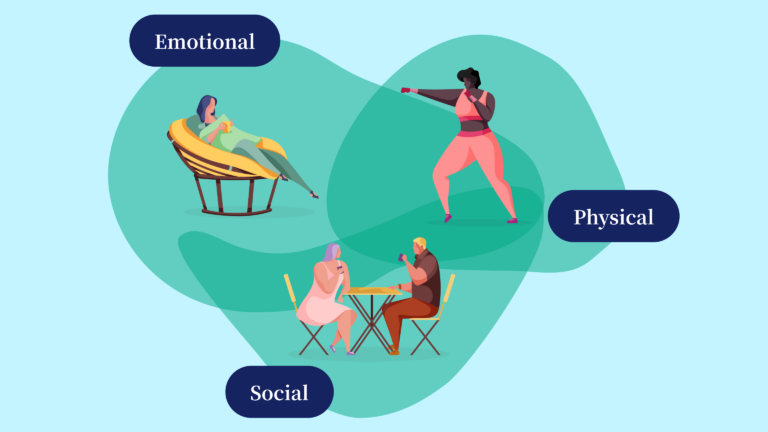The Holiday Season Isn't Joyous for Everyone (And That's Okay), Here's How to Navigate This Topic Consciously

Family time, fun, coziness, warmth and a being together are all words that come up for a lot of people when thinking about the holiday season. But there are plenty of people who don’t feel quite so joyous about ‘the most wonderful time of the year’. And that’s okay, but it’s good to be aware of this and to navigate it in a mindful manner.
Just like any point throughout the year, there will always be people who are high on life while others are going through challenging situations. That’s just how it goes. But it’s good to be aware of this and to know how to navigate it. Especially during times when it might not be as obvious.
It’s not “happy holidays” for all
Particularly if you’re someone who really enjoys the holidays or get’s in the Christmas spirit early December, it’s easy to forget that not everyone feels this way. And there can be all sorts of reasons for this:
- Some people feel lonely at Christmas. Not everyone has a family or friends they can celebrate Christmas and the New Year with. When you see people around you all getting together, and you’re not part of this, it can make your own loneliness feel more acute.
- Grief and loss feel more intense. When we get together with family and friends, it often draws attention to those who aren’t present. This means that grief and loss are often that bit harder around the holidays.
- This sense of loss can also affect people who don’t have a partner or children, despite wanting these things. People who find themselves surrounded by couples and children might feel that the things they don’t have are being rubbed in their face.
- Reliving childhood memories. Being raised in an unpleasant or unsafe family situation, can cause the holidays to feel more difficult.
- Not every culture or religion celebrates Christmas, despite the fact that Christmas doesn’t have a religious significance for an increasing number of people. Christmas was originally a Christian holiday. Buddhists also recognize Jesus and sometimes celebrate Christmas. Jewish people celebrate Hanukkah around November and December. In general, Muslims don’t celebrate Christmas. This means that “Merry Christmas” isn’t a greeting that applies to everybody.
- Some people would rather avoid certain situations and gatherings. This might be because they’ve been through a challenging or traumatic experience with a particular person, because people don’t accept their background or sexual orientation, or because they’re being held to expectations they don’t meet.
- Financial concerns can intensify. Despite the fact that the holidays aren’t, by definition, a period of great expenditure, it’s still an expensive time for many people.
- It can be overwhelming. For example, think of people with social anxiety, burnout, hypersensitivity, autism and OCD.
- Some people work over Christmas. For example, people in healthcare and the hospitality sector. It’s not always fun for them.
And that’s just some of the reasons why holiday season isn’t necessarily a fun time. It’s good to take this into account, so that you don’t cause anybody unnecessary pain.
What can you do?
Being aware that not everybody necessarily enjoys the holidays is the most important thing. So, when communicating, don’t just assume that people will have a “Merry Christmas”, “Happy Holidays” or a “Happy New Year”.
Be mindful about what you say
Pay attention to what you say when you’re greeting people or talking about the December period. For example, say “Merry Christmas, if you celebrate”, instead of “Merry Christmas”. You hear that a lot in the USA. “Enjoy your days off” is another option.
Don’t avoid the topic
You might feel like people don’t want to be confronted with the fact that Christmas isn’t always merry or that the holidays aren’t always happy. However, putting these things into words is one of the best things you can do.
Let people know that you’re thinking about them and that you’re there for them. For example, you could reference this in a card or through another personal message.
Educate people about loneliness
You can inform employees about places they can go to feel less lonely at Christmas. For example, they can do voluntary work, say at a homeless shelter. Or encourage them to hop on a train or a plane and celebrate Christmas somewhere else.
Let staff choose their own shifts
Does work need to be done over the holidays? Then allow employees to volunteer for shifts. Those who don’t celebrate Christmas or would rather avoid Christmas can sign themselves up.
Check in on employees
Check in more with employees who might be having a hard time over the holidays. For example, employees who have lost somebody, been through a divorce or just moved house. Especially if you know that somebody has had a tough year, it can be nice to let them know that people are thinking of them.
Offer support
Everyone goes through their own challenges around this time of year. Over the holidays, make sure that employees are extra aware of your partnership with OpenUp. Whether you’re stressed about all the tasks that are coming up in December or feeling lonely at Christmas, a psychologist can help you through this.




